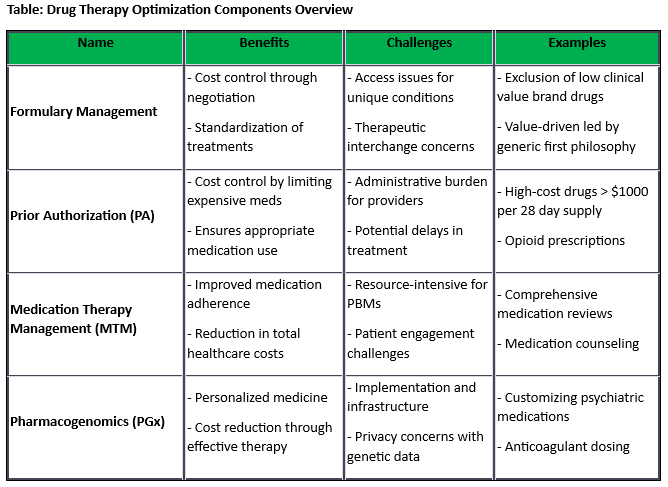As a Director of Benefits, your role plays a vital part in balancing the interests of both patients and employers when it comes to healthcare expenses. One area that requires strategic management is drug therapy optimization. In this article, we will explore a holistic approach to drug therapy optimization with formulary management, prior authorization, medication therapy management, and pharmacogenomics, focusing on the benefits and challenges of each component.
Formulary Management:
- Benefits:
- Cost Control: By negotiating drug prices and promoting the use of generic alternatives, costs can be kept in check.
- Standardization: Ensuring that evidence-based treatments are consistently accessible.
- Challenges:
- Access Issues: Patients with unique conditions may face challenges in accessing specific medications.
- Therapeutic Interchange: Switching patients to different but equivalent drugs may require additional education for healthcare providers.
Prior Authorization:
- Benefits:
- Cost Control: Limiting access to expensive medications helps reduce costs for both patients and employers.
- Appropriate Medication Use: Ensures that patients receive medications when medically necessary.
- Challenges:
- Administrative Burden: The process of obtaining prior authorization can be time-consuming for healthcare providers.
- Potential Delays: Patients may experience delays in treatment while awaiting approval.
Medication Therapy Management (MTM):
- Benefits:
- Improved Adherence: MTM identifies and addresses adherence issues, ultimately improving patient outcomes.
- Cost Reduction: Enhancing adherence can reduce hospitalizations and other healthcare costs, benefiting employers.
- Challenges:
- Resource-Intensive: Providing MTM services can be resource-intensive for pharmacies, potentially requiring additional staffing.
- Patient Engagement: Encouraging patients to participate in MTM can be challenging, as some may be resistant to change.
Pharmacogenomics:
- Benefits:
- Personalized Medicine: Pharmacogenomics tailors drug therapy to an individual’s genetic makeup, potentially improving efficacy and reducing adverse effects.
- Cost Reduction: By avoiding ineffective medications and adverse events, healthcare costs can be reduced in the long run.
- Challenges:
- Implementation: Widespread adoption of pharmacogenomics requires significant infrastructure and education for healthcare providers.
- Privacy Concerns: Handling genetic data raises privacy concerns that must be addressed to protect patient rights.
Conclusion
Balancing the interests of patients and employers in optimizing drug therapy is a multifaceted challenge that demands a strategic approach. A holistic approach to drug therapy optimization must incorporate formulary management, prior authorization, medication therapy management, and pharmacogenomics as focal points. As a Director of Benefits, your expertise in coordinating these components is crucial in achieving optimal drug therapy, improving patient outcomes, and reducing healthcare costs for the benefit of both patients and employers.
